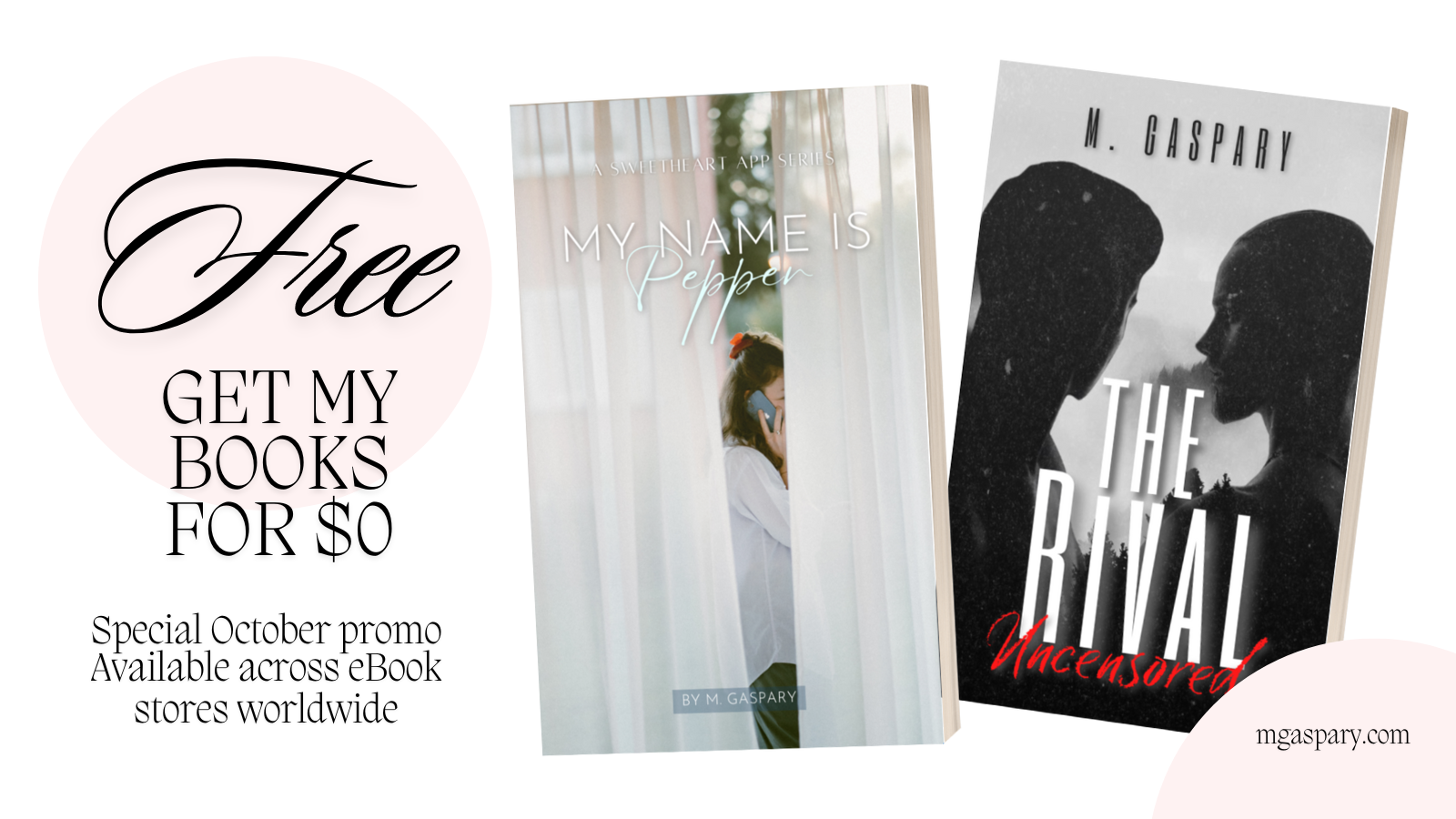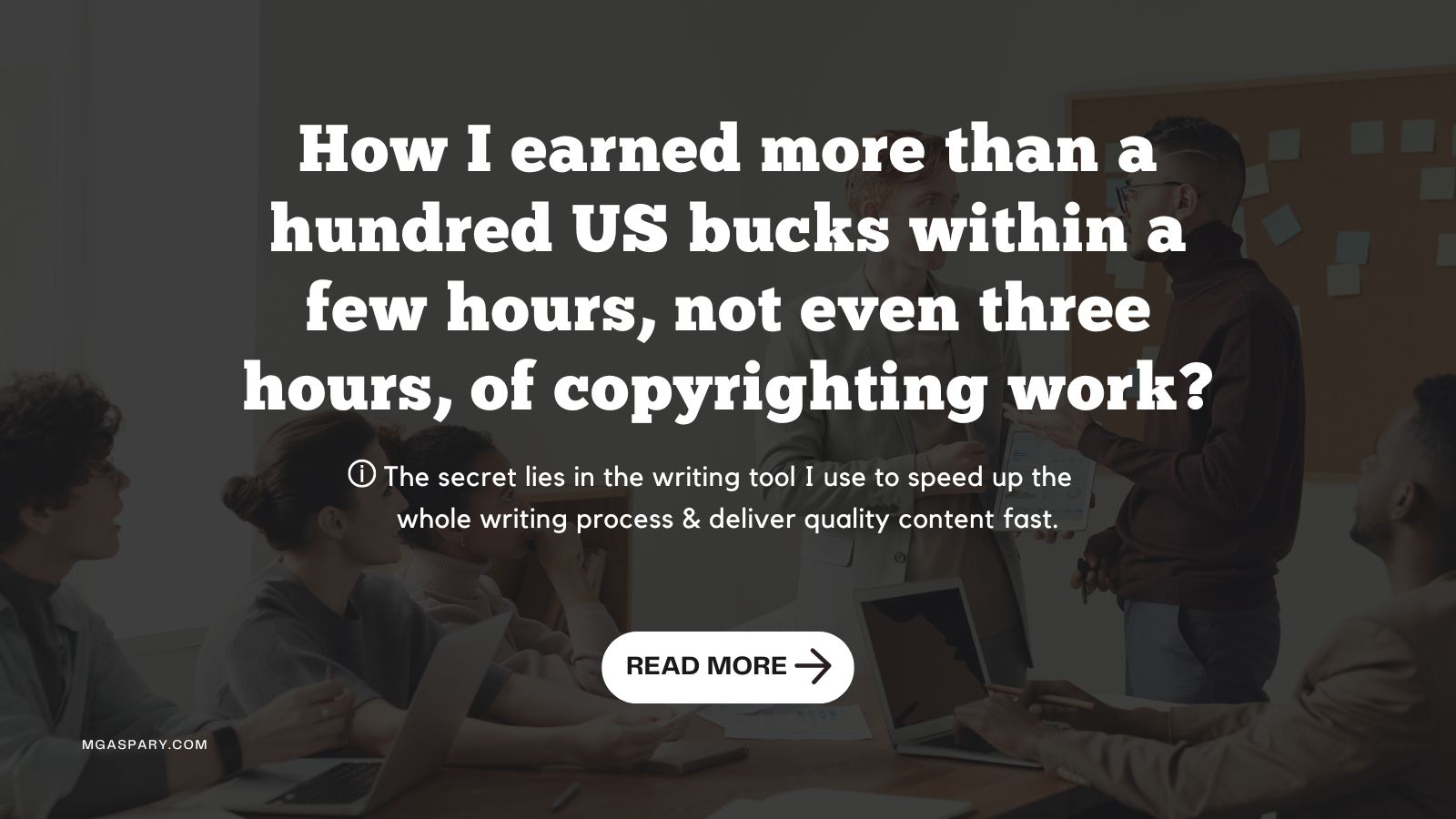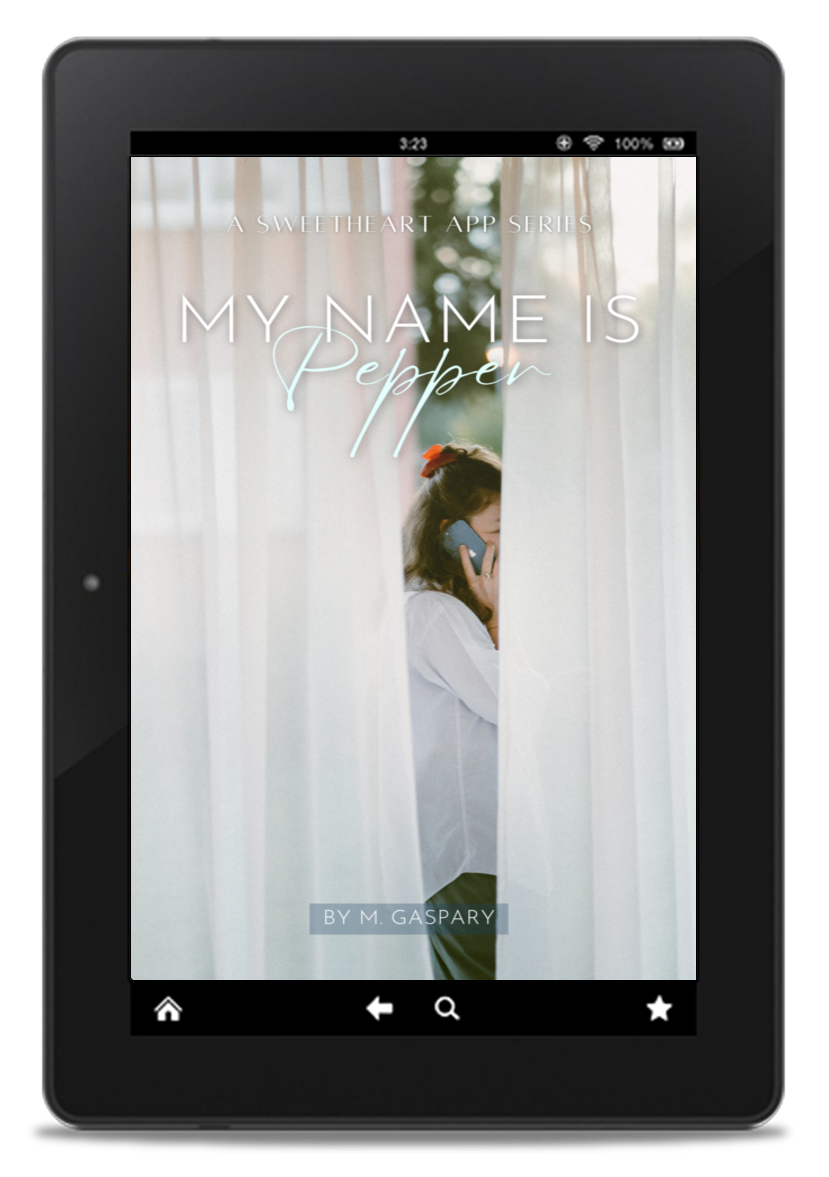You may have heard of copywriting before. But if your goal is to earn money from writing online fast and easily, you have to learn how to become a copywriter. To give you an idea of how much could you possibly earn from copywriting jobs, a client could pay you as much as $30/hr to $60/hr, which is already a fair price even if you don’t have prior experience in the field. Trust me. Take it from my experience.
How To Become A Copywriter Using Free Copywriting AI Tool & Earn $60/Hr In 3 Hrs
At the end of this post, you will learn how to start your copywriting business and monetize your writing skills through learning the step-by-step process, as well as the best practices many established copywriters do to earn hundreds of thousands of dollars each year.
Table of Contents
- How To Become A Copywriter Using Free Copywriting AI Tool & Earn $60/Hr In 3 Hrs
- 3. Create a portfolio to show clients your previous work.
- 4. Find your clients.
- 5. Foster strong and healthy relationships with your clients and avoid trust issues.
Disclaimer: This post contains affiliate links that will help me continue providing quality content just like the one you’re about to read right now. If you like to support me, I earn a percentage of commissions from every click and/or purchase you make.
Don’t worry, it’s free for every click. All it does is give a portion of my share for me when you click and use the link to purchase any product I recommend on the website. Alright?
For more information, you may read my Terms of Service and FAQs to respond to your immediate concerns. If there’s any question or concern, please go to my Contact Page to reach out to me. I’d love to read your message.

If this topic interests you, stick around until the end of this post. To make sure you don’t want to miss anything from me, subscribe to my Substack newsletter, and join 500+ others today.
Alright! Let’s get into it. Shall we?
What is Copywriting?
Copywriting is an occupation that involves writing copies for advertising and marketing purposes. However, according to the world’s master copywriters, copywriting is more than just writing ads. So, how do we truly define copywriting?
Leo Burnett, an advertising executive, in one of his well-known published quotes, said that the “secret of all effective originality in advertising is not the creation of new and tricky words and pictures, but one of putting familiar words and pictures into new relationships.”
A few years ago, I wrote about the different high-paying writing side hustles wherein I included copywriting on the top list and explained why you must own a blog to help you leverage your author brand.
Here’s an excerpt of the post:
This would sound silly but when you start a blog and run it, over time, you unconsciously trained your copywriting skills. Even if you don’t have previous copywriting projects in the past, you can definitely do the job.
Mecyll Gaspary, 2020
What Exactly Does a Copywriter Do?
To understand this potentially profitable profession, you need to understand the main goal of copywriting first. If you remember what I said earlier, for most established copywriters, copywriting entails beyond the writing process itself.
As Joe Vitale, author of “Hypnotic Writing: How to Seduce and Persuade Customers with Only Your Words,” in his book, he said upon describing the writer’s relationship with words:
Words exist like winged energy, transporting us to places high and wide. Words link each of us together as human beings. Words can paint pictures, move us to tears or to joy. Words can expand our consciousness until there are no words for the experience.
Joe Vitale, 2007
In his book, he argues that writers who use the hypnotic element which he calls “hypnotic writing” in anything know how to use the power of words to connect and market anything.
What copywriting actually requires you to do
In the copywriting department (which is your goal), this is viewed as a simplified definition of copywriting itself. Writers use words to seduce anybody, specifically their target audience or readers, regardless of the content they choose to write about.
Simply put, your job is to create a compelling copy while exercising your fluency and master of the English language, as well as your skillful use of words to persuade people to take action (and do anything you want them to do).
Are you still with me?
How to Become a Copywriter & Earn Your First $100 Fast
Before we go through the step-by-step process, let’s hold on for a second. Here are the steps you need to start working as a copywriter:
- Learn the copywriting basics as much as you can.
- Make sure you have the right tools to use to write copies.
- Create a portfolio to show clients your previous work.
- Sign up for an account on Upwork if you haven’t.
- Foster strong and healthy relationships with your clients and avoid trust issues.
As you can see, the steps look less complicated. But, here’s the catch. I’ll talk about it in a second.
For now, I’ll just give you a reminder that at the end of the post, you will see the compiled resources I’ve used to earn my first $100 from copywriting, which includes books, links, and tools for you to try.
Alright? Let’s go back to the list.
1. Learn the copywriting basics as much as you can.
According to Vitale, the best way to become a master copywriter even without prior experience is knowing what words to use and when to use them. Every writer, beginner or experienced, will always use the same approach.
In his book entitled “Hypnotic Writing,” he said that all writers must be able to craft irresistible content; and to do that, one must undergo training to learn how hypnotic writing works. Vitale described compelling copywriting as:
Writing that rivets your eyes to the page. Writing that is so clear and concise and effective that you can’t resist reading all of it. And more than that, Hypnotic Writing gets you to remember—and act—on what you’ve read. Hypnotic Writing is spellbinding, unforgettable, and filled with embedded commands.
Joe Vitale, 2007
A compelling copy answers powerful questions.
In addition to Vitale’s Hypnotic Writing, you can also check out Jon Morrow of SmartBlogger.com. They have tons of copywriting hacks for beginners like you, as their resources have been truly helpful to me.
In one of his webinars I attended around six years ago, he mentioned the two important questions to ask when curating content.
- How do you figure out what’s going on in their heads?
- What can you do to stir their troubled hearts?
Additionally, Morrow also said that the content “should captivate or fill the audience the spark with our posts.” That includes taking advantage of the words that provoke sensations and feelings of anxiety, climax, curiosity, etc. when constructing your drafts.
Quality copy depends on the amount of time you spend crafting and promoting.
On that note, any aspiring writer must know and understand that quality work will depend on the number of hours spent on the writing process and the quality of outcomes it brings.
According to Morrow, these are the keys that played pivotal roles in honing his craft, making it possible to earn as much as $7,000 solely from one blog post. How was this possible?
If you think there’s a secret ingredient, there’s none. All he did is repeatedly applied the basic copywriting principle: your content/copy must be able to tug repressed emotions and become an emotional elephant.
Make use of the power words and emotional words when narrating events without compromising the content and its flow. It is your job as a copywriter to choose the right words and the right length.
You must be able to stir emotions for your audience to provoke action. Because you know, we all know it too well that human beings are best when regretting past choices.
Got it?
2. Make sure you have the right tools to use to write copies.
When it comes to choosing the right tools to use for your copywriting business, I have two main points to share with you.
- Using AI-generated content for copywriting is okay.
- Embracing technological changes in the publishing industry is a necessity not an option.
- Using AI speeds up your turnaround rate without compromising quality (helpful for freelancers)
- Starting a copywriting business doesn’t have to be expensive.
a. Using AI-generated content for copywriting is okay.
Nowadays, it’s worth noting the influx of using AI (artificial intelligence) in our writing routines. With the rise of its use in many businesses, it is not a surprise to see many AI-generated tools mainly for writing to assist writers in various reasons.
The fact is using artificial intelligence in our writing routines has become a trend even in the book writing business. In my previous blog post published two years ago, I mentioned these events as predictions (at that time) saying:
This is the problem: while you’re still in the process and wasting your time because of your relentless excuses, AI bloggers could already be ahead of you.
While you’re still confused about what you want to share, AI bloggers have already have written something about it.
Humans are born intelligent in comparison to other creatures. But we simply can’t do what machines can. We can’t work for 72 hours without sleeping. We naturally need rest to function better.
[…] Once AI bloggers will be on the rise and make an influence in the public domain, chances are, you’re likely to be replaced by AIs on the top of Google’s page. [It will be unfortunate if] their posts will be more preferable to read than your content.
Mecyll Gaspary, 2020
Well-known advocates for AI in writing
World-renowned authors like Joanna Penn with whose many of her works garnered more than one New York Times bestselling title. Like Penn and so many other writers have been advocates of using AI in writing.
In her podcast episode entitled “Writing In An Age Of Artificial Intelligence (AI),” she argued that denying its existence and unwillingness to embrace unpreventable digital changes involving AI will prevent us from the possible reinvention, especially in the publishing industry.
b. Embracing technological changes in the publishing industry is a necessity not an option.
Given the current circumstance in the ongoing technological change, it is wise to implement new ways to establish writers as authors, given that the “future is approaching faster than we thought,” she mentioned in the episode.
Penn added that these changes aren’t far anymore, as we are not expecting years before we see how more writing opportunities in collaboration with AI will increase.
Though she initially felt some kind of a threat, every writer must be aware of the new ways and ready to embrace these kinds of changes in our writing routines. In one of her blog posts, Penn wrote on her website describing her experience with AI in her writing process:
In the last six months, I’ve felt a significant acceleration – a shift from AI being a thing of the future to it becoming very much of the now. It feels like 2009 all over again in terms of the level of excitement I feel and the new tools that are emerging are both exhilarating but also terrifying for those who don’t embrace the change.
Joanna Penn, 2019
c. Using AI speeds up your turnaround rate without compromising quality (helpful for freelancers)
Not only does it help you craft compelling copy faster, but using AI will also help us accelerate our workflow and provide our clients a fast turnaround in their projects.
As a result, we will have higher chances to cultivate great relationships with our clients; at the same time, using AI helps us learn and improve our writing skill set, especially for writers who are non-native English speakers (like me).
To learn more about different platforms for AI-generated content, I compiled an exhaustive list of “24 AI Content Generators to Write Better Content in Seconds” for you.
d. Starting a copywriting business doesn’t have to be expensive.
Seriously, I didn’t spend a dime on the copywriting tools because I honestly tried my best to find the best ones available and, of course, available for free, although I will not be able to enjoy its features (not until I could finally afford to pay for monthly subscriptions).
Highly recommended AI tools for beginner copywriters
Despite having only free accounts on the following tools, I still highly recommend using them if you haven’t already because they’ve been truly helpful in fostering clients with my quality work. For copywriting, these tools will help you create quality content faster like:
Try using AI in your first copy today!
If you are interested to test your copywriting skills in collaboration with AI, I highly recommend you start trying Copy.ai for your first project.
It’s not been too long ago since I first discovered it through one of my previous clients, but it has been one of my favorite tools to use to write copies and other types of content for my clients since I first tried it.
Interested? Click here if you like to learn more about Copy.ai.
3. Create a portfolio to show clients your previous work.
If you want to increase your likelihood to get copywriting jobs, you have to make sure you can present a legitimate presence online. This is because your clients will do a review, more like a background check, to get to know you before they hire you.
Right now, you’ve got a ton of available resources and platforms that will help you to achieve exactly just that. Aside from Copy.ai, which I personally use, you also have others like Rytr and Jarvais.ai to name a few. Click here to see more AI content generators.
Around two years ago, I wrote about “How to Brand Yourself as a High-Income Writer – As an Author!” wherein I shared in detail the reasons today’s writers need to consider branding in their book publishing dreams. Go check it out!
Why does branding mean a lot as a writer in today’s publishing system?
Like many content creators today, unfortunately, writers have to embrace the new ways of publishing their works to survive and thrive using their creativity. It’s our new way of life, and gone are the days when publishing a book was given special privilege.
What are the available options to start building an online presence?
a. Start building your portfolio – Nowadays, setting up a professional website in various forms has become more available to ordinary people, and the majority of those have no programming or coding skills.
To aid aspiring writers like you, you’ve got plenty of options depending on your goal and budget allocated for your business, such as:
- Self-hosted
- free hosting
- Third-party platforms like Medium.com or guest blogging
If you are uncertain which platform would be best for your writing business, I’d like you to check out my ultimate online course for beginner writers wherein I discuss these options in detail. And it’s completely free!
b. Build an online community to find your first 1,000 true fans – You can do this by setting up your own LinkedIn account and connecting with other writers around the world, as well as other professionals in different types of fields.
Cultivate strong connections with people through networking online. If you like to read more about this, you can my separate post that will teach you how to use LinkedIn effectively for writers.
4. Find your clients.
Aside from finding your first 1,000 true fans aka your Tribe, you must know where to find your clients. Among the popular options for many writers is signing up on Upwork. You can also find them through networking using LinkedIn.
And if you are a Filipino freelancer, you can also visit Onlinejobs to find your next client since many foreign clients tend to sign up on this platform for Filipino remote workers. (This is where I got hired to work for a real estate firm that paid me $3,000.)
If you like to read more about how Onlinejobs helped me find clients that pay, I highly recommend you read my post “Onlinejobs.ph Review.”
5. Foster strong and healthy relationships with your clients and avoid trust issues.
Earlier, I mentioned building an online community to find your first 1,000 true fans, right?
I’ve tried many social media platforms to grow as a writer over the years. Although established have varied preferences, one of the platforms that worked best for me is LinkedIn.
By default, using LinkedIn as your social media platform will allow you to connect with other writers from different parts of the world, as well as other professionals in different fields. Unlike other platforms, LinkedIn gives you room for professional growth.
Additionally, you can take advantage of LinkedIn Pulse to showcase your writing skills by publishing posts regularly. So, you don’t have to own a website right from the beginning if the budget doesn’t allow it.
Nonetheless, LinkedIn is highly recommended for this purpose, though you can add Instagram, Facebook, YouTube, or TikTok if you like.
Highly Recommended Copywriting Books
When I started my new copywriting venture a few months ago, I had no idea about the process nor had any sort of training and professional background in the past. I don’t know how it’s going to be for me to handle the expectations of clients from me (if they hire me for the job).
Despite all that, I still continued searching for copywriting jobs, though it was clear to me that I may fail to convince clients to hire me—having no copywriting experience. If you’re wondering how it all ended up, stay towards the end of the post, and I’ll tell you the good news!
Alright? Let’s move on.
My personal favorite copywriting references
Though it was scary, I managed to find these books from the recommendations list on Apple Books. I remember I found them in a broad daylight when I was laying down on the couch, desperately searching for new writing adventures.
As bored as I was, I consider myself fortunate and feel grateful to have found these books, which I highly recommend reading if you plan to start a copywriting business.
I have been using them as my favorite copywriting references whenever I find myself stuck at my work. You can check them out and see how valuable they will become in your writing career yourself.
- “Hypnotic Writing: How to Seduce and Persuade Customers with Only Your Words” by Joe Vitale
- “Words That Sell: More Than 6,000 Entries to Help You Promote Your Products, Services, and Ideas” by Richard Bayan (Read on Goodreads)
- “On Writing Well, 30th Anniversary Edition: The Classic Guide to Writing Nonfiction” by William Zinsser
- “Successful Self-Publishing: How to Self-Publish and Market Your Book” by Joanna Penn (Free on Kindle)
Author’s Side Note
If you want to learn more about William Zinsser and his valuable lessons for writers, check out my separate posts below:
- 3 Big Reasons Why Do You Want To Write
- Fear of Writing? Find Out the Root Cause & Tips to Overcome It
I have also compiled more writing tools and resources for you to try. If you want to take a look at them and see which of the ones I’ve recommended will work for you and whatnot, click below.
Additional Useful Copywriting Resources for Beginners
- 44 Copywriting Formulas To Level Up Your Content Marketing by Stacey Corrin (blog post)
- Writing With AI: Artificial Intelligence Writing Applications And Tools Using Natural Language Generation (NLG) by Joanna Penn (blog post)
- Click here to try the Best Title Generator tool I use. (Free tool)
- Copy.ai (Freemium)
Final Thoughts
Is copywriting a good career?
If you’re up for selling your writing skills online, my answer is yes. Copywriting is a great way to start to earn an income as a writer, as long as you follow the pieces of advice I mentioned in this post. The key is having the right tools to use to provide quality copies for your future clients.
When I started receiving copywriting jobs recently, as I mentioned earlier, I have no formal training or background in writing copies. Thankfully, with the help of the tools and resources I collected from research, I was able to do the job well.
Just a few weeks ago, I got a new copywriting job offer that paid $60/hr. From Day 1 as a copywriter, I earned around $170 (excluding transfer fees and other bank transfer costs).
Thanks to this tool (see the link below).
So, how about you? Do you want to become a copywriter today?
What do you think about this potentially lucrative writing opportunity for aspiring writers?
Let me know in the comment section below.




Leave a Reply